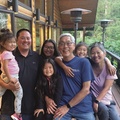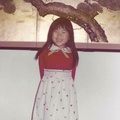For professional opera singer Nina Yoshida Nelsen, the path of life has been full of unexpected twists and turns. But she would not have had it any other way.
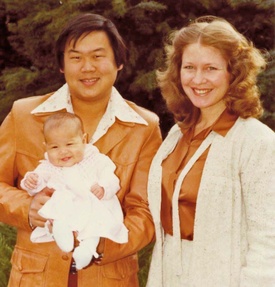
Born Nina Kiyoka Yoshida on Sept. 19, 1979, to sixth-grade teacher Ron Yoshida and artist Janice Blair Yoshida, Nelsen grew up alongside her brother, Mitchell, in Santa Barbara, California. One day as a third grader, she surprised her parents by telling them she wanted to play the violin.
“They had no idea how I knew what a violin was,” Nelsen said.
Nelsen also picked up the flute in the fourth grade and began acting in junior high. When she entered her freshman year at Santa Barbara High School, she planned on continuing theater as an elective; until she realized she was accidentally placed into an English as a Second Language theater class, in which everyone only spoke Spanish.
Instead of changing her whole schedule around, she found a replacement course focused on music appreciation. The teacher of that class turned out to be the choir director, and she encouraged Nelsen to audition for the school’s well-renowned choir. Nelsen made the cut and fell in love with singing.
After graduating high school, Nelsen received a violin scholarship from Boston University, where she majored in violin and psychology. During her junior or senior year, a local patron of the arts gave Nelsen a small scholarship for voice lessons. The woman had heard Nelsen perform in the Santa Barbara high school choir and encouraged Nelsen to pursue singing. Although she initially planned to earn her master’s degree in psychology, Boston University offered Nelsen a substantial scholarship for a master’s degree in voice, an opportunity she could not refuse.
In 2002, Nelsen’s father, Ron, suddenly passed away. Nelsen finished her master’s degree and moved back home to California to be with her mother. While she was home, she met musician Jeff Nelsen through a mutual friend. The pair got married 15 months after meeting and soon moved to New York because of Jeff’s job on Broadway.
While in New York, Nelsen’s friend introduced her to a voice teacher from the Academy of Vocal Arts in Philadelphia, a critically acclaimed tuition-free institution dedicated to operatic training and performance. The school’s four-year program is highly competitive and only accepts approximately 30 singers per year. Nelsen auditioned and was accepted into the prestigious academy. The rest is history.
“I always had a very different route than most singers because I was married before I was an opera singer. I was pregnant with my first child when I made my debut as a professional opera singer. Not your standard path, but it was my path,” Nelsen said.
Nelsen is currently based out of Bloomington, Indiana, where she lives with her husband, Jeff, and sons, Rhys and Blair. Jeff teaches horn at Indiana University Jacobs School of Music and plays French horn with the Canadian Brass, a brass quintet. Rhys is a talented musician in his own right; he is only in the sixth grade, but he has already had two piano performances at Carnegie Hall. Because Nina and Jeff’s jobs require them to travel throughout the year, they have the help of a live-in nanny and stay connected to the boys with the help of FaceTime, the iPhone’s video calling application.
An American Dream
Nelsen is currently on the road again, reprising a role close to her heart: the character Mama in An American Dream, a modern opera written by librettist Jessica Murphy Moo and composer Jack Perla.
An American Dream was born out of Seattle Opera’s 2011 Belonging(s) Project, in which the company posed the question: “If you had to leave your home today and couldn’t return, what would you want to take with you? Why is that object, that memory, or that connection to your past so important?”
Seattle Opera received and filmed dozens of responses from community members; however, two powerful stories from World War II emerged – one from a Japanese American woman and the other from a German American woman. Moo and Perla were inspired by these women to create the fictional families at the center of An American Dream. The opera follows Eva, a Jewish woman from Germany immigrating to Puget Sound, Washington, and Setsuko Kobayashi, a Japanese American girl living in Puget Sound with her parents, Papa (Makoto) and Mama (Hiroko). Eva and Setsuko’s lives become inextricably intertwined as the harsh reality of war sets in.
Seattle Opera approached Nelsen in the summer of 2014 to ask if she was interested in participating in An American Dream week-long workshop. At the end of the workshop, Nelsen and the other performers put on a recital for several patrons to gauge if the opera was worth producing. The patrons enjoyed the show but thought that Nelsen’s character Mama could be further developed. Moo and Perla set off to compose an aria, a long song written for a solo voice in an opera, to give Nelsen’s character more of a backstory.
They did not have to look far for inspiration; Nelsen’s own grandmother, Masako Yoshida, shared a real-life World War II experience with the fictional Kobayashi family: Japanese American incarceration.
This Sunday marks 81 years since President Franklin D. Roosevelt issued Executive Order 9066 on Feb. 19, 1942, authorizing the removal of individuals living on the West Coast to concentration camps further inland. These individuals supposedly posed a threat to national security. It was never explicitly stated; however, it was clear that the order was aimed at targeting individuals of Japanese ethnicity, after suspicions arose following Japan’s attack on Pearl Harbor on Dec. 7, 1941.
In the months following the executive order, Masako Yoshida and her family, along with more than 120,000 people of primarily Japanese ancestry, many of which were Japanese American citizens on the West Coast, were forced to pack up their lives in a couple of suitcases and evacuate their homes. They were forced to live in makeshift assembly centers before being sent to remote concentration camps in harsh desert climates until the end of the war.
Masako met the man who would become her husband, Mitsuo Yoshida, at the Poston War Relocation Center in southwestern Arizona when she was around 18 years old, close in age to the character of Setsuko. Coincidentally, Nelsen’s character Mama is around the same age Nelsen’s great-grandmother, Kiyoka, was when she and her family were unjustly incarcerated. Nelsen, who is named after her great-grandmother, said that working on An American Dream helped open a conversation about the war with her grandmother.
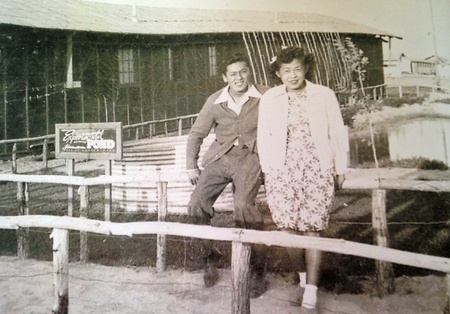
“I knew very little about my grandparents’ experience,” Nelsen said. She recently found out that her great grandfather was taken to Fort Lincoln in North Dakota, where he was held for six months until he was released to return to his family, who was already in Poston by then.
An American Dream had its world premiere at Seattle Opera in 2015. Nelsen’s grandmother sat in the very front row and was able to witness her granddaughter on stage before passing away two years later. Nelsen is looking forward to the opera’s upcoming premiere at her hometown company, Opera Santa Barbara, on Saturday, Feb. 18, since many of her friends and family are coming to the show. The two performances on Feb. 18 will premiere a newly added scene between the characters of Mama and Setsuko.
Asian Opera Alliance
If Nelsen is not traveling, performing or spending time with her family, you can often find her working on her latest endeavor: the Asian Opera Alliance.
On March 16, 2021, six women of Asian descent were killed in a mass shooting event in Atlanta, Georgia. Nelsen started seeing opera companies make social media posts condemning the shooting and voicing support for their Asian artists. While scrolling through the posts, she realized that every Asian artist featured had been typecast into an Asian role.
When Nelsen examined her own career, she realized that she had sung only three non-Asian roles over the course of a decade. In comparison, she performed in Giacomo Puccini’s Madama Butterfly more than 150 times, primarily as the mezzo-soprano role of Suzuki – a role that she enjoyed; but was surely not the only character she was capable of portraying.
Nelsen realized that something had to be done to address the lack of Asian representation in opera; and that she needed to help lead the movement as one of the more senior artists in the Asian American opera community.
“I looked around and I realized I was one of the oldest Asian American singers in the industry that’s working right now. I was just shocked by that,” Nelsen said.
Inspired by the Stop Asian American Pacific Islander Hate movement, Black Lives Matter movement, and the Black Opera Alliance, Nelsen and two friends came together to form the Asian Opera Alliance. AOA was created for Asian identifying opera creatives – not just singers; directors, conductors, set designers, composers and all sorts of people who work in the industry are a part of AOA.
“We just decided when we formed the Asian Opera Alliance, we wanted to serve as a resource because we love opera. We want to help opera,” Nelsen said.
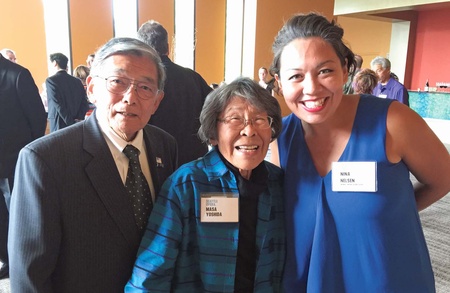
On July 22, 2021, the Asian Opera Alliance sent an open letter to every general director of approximately 200 opera companies in the U.S., advocating for equity in the opera industry. In the fall of that year, Nelsen knew she had to take AOA to the next level by becoming a nonprofit organization. She filed the proper paperwork and put together a board. In October 2022, Melody Chang Heaton, director of marketing at Inland Northwest Opera, was announced as AOA’s first executive director.
AOA offers programming such as a professional development series for their artists, classes for Asian identifying opera singers, and bi-monthly community building events. The AOA website also includes educational resources focused on Asian representation, AAPI issues, and producing Madama Butterfly responsibly.
In the 2021-22 season, Nelsen participated in Boston Lyric Opera’s seven-part discussion series, “The Butterfly Process,” which examined problematic aspects in the production of Madama Butterfly. Nelsen currently serves as the artistic advisor to Boston Lyric Opera. In 2022, she hosted and curated the five-episode Metamorphosis Podcast by The Atlanta Opera, which analyzed the complex cultural aspects of Madama Butterfly. Nelsen reprised her role as Suzuki for The Atlanta Opera’s November 2022 production of the show.
Nelsen continues to meet regularly with the AOA leadership team and hopes that they will be able to see tangible results from their efforts soon in the realms of casting and representation. AOA is completely volunteer-managed and primarily runs on donations, so it is truly a labor of love.
In the early days of AOA, Nelsen had to educate herself on what it meant to be an advocate.
“I had never spoken out in my life about anything. I was always the person who was quiet in the back of the classroom, who knew the answer, but never raised my hand; because I was afraid to speak out. And I was afraid to also be wrong.”
But Nelsen overcame her fear, and her love for opera has fueled her passion to keep learning, growing and speaking up on behalf of her fellow Asian artists – her colleagues she sings with on stage, the many professionals working offstage, and of course those who are yet to come. She remains hopeful and patient in the never-ending fight to effect real change.
“How can we help our art form move forward? That was a question we really thought a lot about. We decided that in our advocating, we wanted to start calling people in, instead of calling them out. Let’s call people in. Let’s work together because we all love this art form.”
* * * * *
To learn more about Nina Yoshida Nelsen, visit ninayoshidanelsen.com. To learn more or to donate to the Asian Opera Alliance, visit asianoperaalliance.com.
According to Hawaii Opera Theatre, An American Dream will be performed in the fall as part of the mainstage season, with performances on O‘ahu and the neighbor islands. Visit hawaiiopera.org for more information as it gets closer to the fall season.
*This article was originally published in The Hawai'i Herald on Februray 17, 2023.
© 2023 Jackie Kojima


